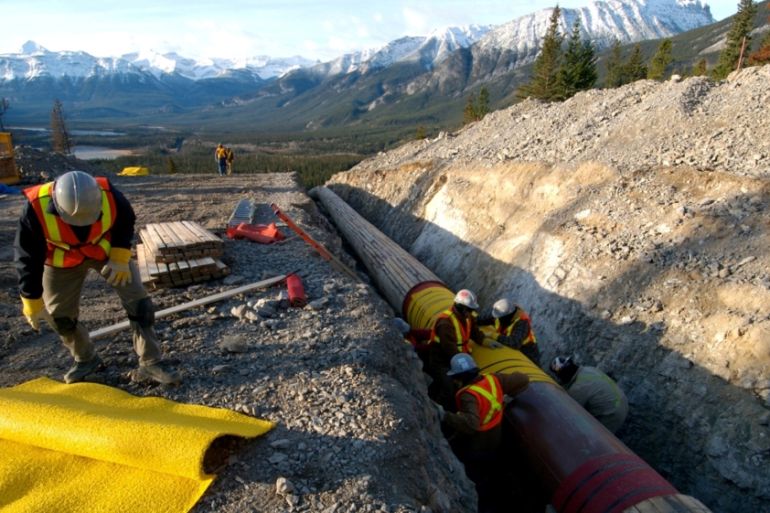PM Trudeau greenlights controversial oil pipelines
Prime Minister Justin Trudeau says approval of the two contentious pipelines “is in the best interest of Canada”.

Ottawa, Canada – Canada has approved two controversial oil pipelines, despite growing criticism from environmental groups and Indigenous communities that have vowed to block the projects.
Prime Minister Justin Trudeau announced on Tuesday that his Liberal government had approved a plan to replace a continental pipeline known as Line 3 from Alberta to the United States, and expand a pipeline running from Alberta to the coast of British Columbia (BC), known as the Trans Mountain pipeline.
Keep reading
list of 4 items‘We need you’: Solomon Islands’ support for US agency’s return revealed
Why are nations racing to buy weapons?
Parallel economy: How Russia is defying the West’s boycott
“The decision that we took today is in the best interests of Canada and the best interests of Canadians,” Trudeau said at a press conference on Tuesday afternoon.
“This is a decision based on rigorous debate, on science, and on evidence. We have not been and will not be swayed by political arguments, be they local, regional or national. We have made this decision because we are convinced it is safe for BC and it is the right one for Canada.
“It is a major win for Canadian workers, for Canadian families, and for the Canadian economy now and into the future,” Trudeau added.
The government also directed the National Energy Board of Canada (NEB) to dismiss an application for a third project, the Northern Gateway pipeline in northern BC, Canada’s westernmost province.
READ MORE: Life on the Pine Ridge Native American reservation
But environmental groups and Indigenous leaders across Canada denounced the government’s decision to approve the Line 3 and Trans Mountain pipelines and vowed to continue fighting against the projects.
The Treaty Alliance, a coalition of more than 100 First Nations and Tribes across North America, said in a statement that “neither pipeline will see the light of day”.

“Let’s be clear, this is about our survival,” said Rueben George of the Tsleil-Waututh Nation in BC.
Grand Chief Stewart Phillip, president of the Union of BC Indian Chiefs, added that just as the government under former Prime Minister Stephen Harper discovered, “there’s a vast difference between approving a tar sands pipeline and actually getting it built”.
Meanwhile, Aurore Fauret, the tar sands Campaign Coordinator with climate justice group 350.org, said the decision to approve the pipelines means that Canada will not meet its commitment under the Paris climate agreement.
“Justin Trudeau has broken his promises for real climate leadership, and broken his promise to respect the rights of Indigenous peoples,” Fauret said.
Energy giant Enbridge Inc. operates Line 3, which runs between Alberta and the US state of Wisconsin. The cost to build a 1,660-kilometre replacement pipeline is estimated at around $6bn.
Originally built in 1953, the 1,100km Trans Mountain pipeline, meanwhile, stretches from Edmonton, Alberta, to an export terminal in Burnaby, BC.
Kinder Morgan, the company that operates the pipeline, estimates that expanding to a twinned pipeline would almost triple its capacity from 300,000 barrels of oil per day to 890,000 barrels daily.
The company says the $5bn US project is necessary to transport oil from the Alberta tar sands to markets beyond the US, with a particular focus on Asia. It also says it will create thousands of jobs and generate income for Canada.
![Environmental groups and Indigenous leaders across Canada denounced the government’s decision to approve the Line 3 and Trans Mountain pipelines [Reuters]](/wp-content/uploads/2016/11/7ca032b933fa4561b454328d7722c61f_18.jpeg)
In May, the NEB, the regulatory body that decides on oil and natural gas projects across the country, recommended that Canada approve the Trans Mountain expansion project as long as 157 conditions were met.
The government had until Dec. 19 to make a decision on the Trans Mountain pipeline, after a ministerial committee released a report raising questions about its environmental effects and impact on Indigenous communities.
While leaders in Alberta had pushed for the pipeline’s approval, critics of the Trans Mountain project included the mayor of Vancouver, Gregor Robertson, and other BC politicians, as well as environmental groups and Indigenous communities.
Many have raised concerns about what a potential oil spill would do to the environment, and have criticised the federal government for failing to take into account Indigenous land rights and the impact on their traditional way of life.
READ MORE: Canadian First Nation cleans up latest fuel spill mess
On Monday, a First Nation community along the Trans Mountain pipeline route in BC vowed to stop its construction.
“[We are] still of the mind to say no to the expansion of Kinder Morgan,” said Chief Maureen Thomas of the Tsleil-Waututh Nation.
“For me, it means the survival of Tsleil-Waututh Nation for many years to come,” Thomas told CBC News.
A large crowd of protesters gathered in Vancouver Tuesday evening to protest the Kinder Morgan pipeline’s approval.
Canadians also held vigils in over 45 different locations across the country last week in opposition to the project.
Enbridge’s Northern Gateway project, which Trudeau’s government rejected on Tuesday, sought to build twine pipelines from Alberta to Kitimat, in northern BC, for export to Asian markets.
“It has become clear that this pipeline is not in the best interests of Canadians,” Trudeau said.